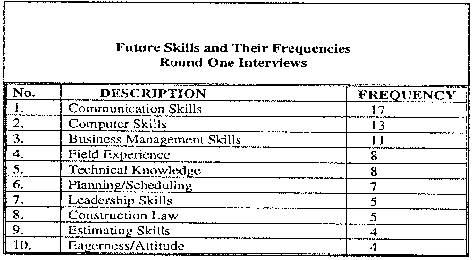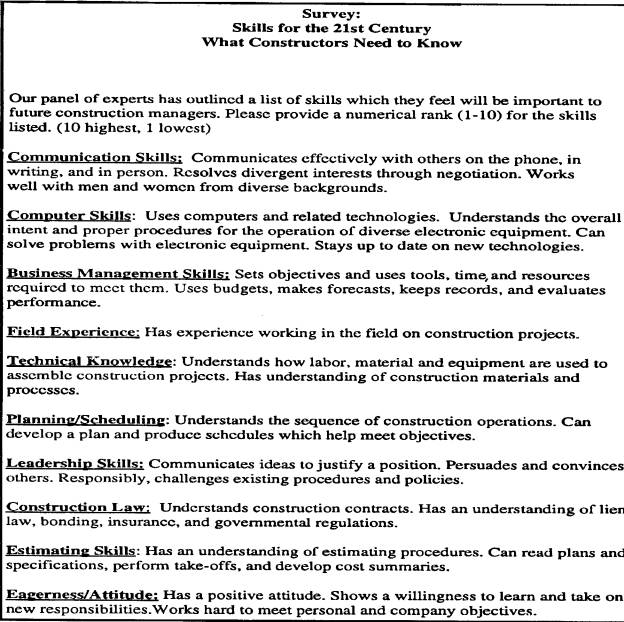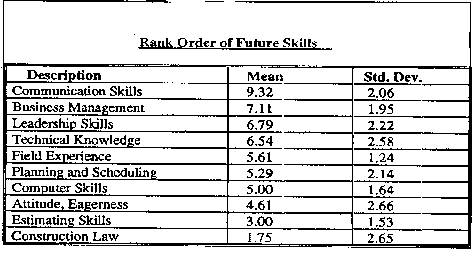|
(pressing HOME will start a new search)
|
|
Skills
for the 21st Century: What Constructors Need to Know
|
Stephen
P. Mead Department
of Construction Management East
Carolina University Greenville,
North Carolina |
Gary
Gehrig Construction
Management Colorado
State University Fort
Collins, Colorado |
|
Increasingly,
the construction industry looks to college construction programs to
help meet the need for trained personnel. In the past, construction
educators have done an admirable job of preparing constructors for the
workplace. But the construction business environment is changing
rapidly, and there is evidence that construction curricula must also
change to meet the demands of a changing marketplace. How
can construction education keep up with a rapidly changing world? To
answer that question, a panel of experts was asked to consider the
specific competencies which entry level constructors will need to
manage effectively in the near future. A Delphi study was used to
generate a consensus of opinion about the competencies. The
results are revealing. In the future, constructors will need to be
solid communicators who know how to read, write and listen
effectively. This emphasis on "people skills" seems to
reflect the increasing need for generalist managers who know
technology and people. In addition, tomorrow's managers will need to
be strong leaders with broad business and planning skills. This
doesn't mean that educators should scrap their curricula. Future
constructors will still need a strong background in construction
technology, scheduling, and estimating. These subjects form the core
of most of today's construction programs. But increasingly, the
experts also see a changing world, where constructors will need
practical field experience, computer expertise, and a solid
understanding of construction law. In
conclusion, if construction education is going to meet the demands of
a changing world, we will need to develop new teaching strategies
which refine our studentís people skills, foster their hands-on
technical experience, and strengthen their computer literacy. Keywords:
Construction, Education, Competencies, Curriculum |
Introduction
As
the world prepares for the twenty first century, the construction industry can
look back and consider its progress. Remarkable advances in management,
technology and engineering have let us touch the sky with buildings, harness
the power of rivers, tunnel beneath the sea, and bridge the widths of
impassable waters. Globally, our built environment bears testimony to the
constructor's ability to move people, information, and technology.
Over
the last century, the building business in the United States has witnessed a
remarkable expansion. Isolated from foreign competitors and fueled by a
burgeoning population, the American building business has grown steadily.
According
to the National Research Council, "Construction of housing, other
buildings, civil works, and the utilities accounts for about 10 percent of the
world's total output of goods and services, and well over half of total
domestic investment. Buildings and other constructed facilities influence the
efficiency of a wide range of economic and social activities, and the
productivity of nations." In 1992 the construction business contributed
over 3 92 billion dollars to our national income, and provided jobs for over
5.5 million people. Construction in the United States accounts for about
twenty five percent of the world's total construction activity. (National
Research Council, 1988)
Future
Forces
Some
of the forces which will drive change over the next decade include: (National
Research Council, 1988)
-Globalization:
With the passage of NAFTA, and the easing of trade restrictions with the
eastern rim, and Europe, construction services, materials and equipment are
suddenly a global commodity. This means new markets for American firms, but
increased competition here and abroad.
-Management
and Finance: Global competition brings increased capacity to the United States
construction industry. To stay competitive, managers will continue to flatten
organizational structures. To expand into new world markets, companies will
realign through joint ventures and acquisitions. Firms with the ability to
package and assist with project financing will have a competitive edge in the
future.
-Environmental
Impacts: Increased awareness of the environment will create demand for
remediation services, pollution control equipment and energy conservation.
Building products will come under increased scrutiny by regulators. Waste
disposal problems mean increased emphasis on waste minimization and recycling.
Increasingly, contractors will need an awareness of risk management and
environmental liability.
-Technical
Forces: Advanced information technology is revolutionizing the construction
business. New materials and processes will improve building performance and
enhance construction productivity. A diminishing skilled workforce will foster
the development of robotics and off site fabrication techniques.
Construction
Managers
At
the managerial heart of this changing business is the constructor or
construction manager. Often called enlightened generalists, today's
constructors must have a solid background in building technology, planning,
business management, verbal and written communication, and people skills.
Given the diverse technical components of building, and the scores of
personalities involved, constructors must be knowledgeable technicians, adept
problem solvers, and most of all solid communicators.
Construction
professionals with this unique blend of knowledge are in high demand. A recent
study by the American Institute of Constructors projects that 10,000
construction managers will be needed each year to fill the future management
needs of the industry (Dorsey, 1992).
Construction
Education
Over
the past two decades, construction firms have looked to college level
construction management and construction engineering programs to fill this
demand. Unfortunately, there is evidence that these programs are having
problems keeping up with the change that surrounds us. Limited funding,
cumbersome bureaucracies, and accreditation restrictions prevent educational
programs from making dramatic shifts. A report on construction education by
the Business Roundtable notes: "Many barriers, including faculty
strengths and preferences and university structure make changes difficult...
Furthermore the desire to acquire or maintain accreditation by the appropriate
industry makes sharp shifts in curriculum difficult. Changes will be very
difficult to achieve in the short run." (Business Roundtable, 1982).
Given
these problems, how can construction education keep up with a rapidly changing
world and meet the demand of the industry it serves?
Objectives
One
proven technique for achieving future objectives is strategic planning. With
effective planning construction educators can forecast future trends and
develop new curricula which will meet the needs of the industry. As such, the
objectives of this study were:
-To
assess the work skills which entry level construction managers will need to
manage effectively in the next five to ten years.
-To
prioritize those skills in terms of importance.
-To
recommend actions, which will help educators, deal with a changing future.
Methodology
For
the past thirty years, Delphi studies have been used widely as a forecasting
tool. As such, they provide an accurate way of looking at the future. This
investigation used a modified Delphi study to predict how these trends will
affect what future constructors will need to know.
In
its simplest form, the technique uses one on one interviews or questionnaires,
which are distributed to individuals who are considered experts in the field.
In turn the responses are summarized and organized into another survey
instrument, which is again circulated to each of the panel members. The
process continues until a consensus is reached. (Linstone, 1978)
Round
One Interviews
During
round one of this study, a panel of thirty experts was assembled. These panel
members, who had significant industry experience, were asked to identify
changes within the construction industry in the next five to ten years.
Additionally, they were asked to identify the skills, which would be most
important to entry level constructors in the next five to ten years. At the
end of the interview process, their responses were summarized and the
frequency of each response was noted.
A
questionnaire was then developed which briefly described each skill noted by
the panelists. Panelists were then asked to rank the skills in terms of
importance from 1-10. The responses were collected and then analyzed
statistically using a computer generated statistics program (SPSS).
Population
Panelists
were selected from the "constructor level" membership of the
American Institute of Constructors, a construction professional organization.
To achieve the constructor level, a member must have a construction degree,
seven years of professional experience, and complete a professional profile.
Thirty constructors were identified who were associated with a broad range of
commercial, industrial, and institutional construction firms.
Generally,
these "experts" averaged 20 years of experience with a wide variety
of commercial building projects. The size of the panelist's firms ranged from
small to large, with an average yearly volume of 120 million dollars.
Panelists represented geographically diverse regions of the United States.
How
the Experts See the Future
The
first round interviews produced a wide range of responses and addressed over
twenty different competencies. For the purposes of this study the ten most
frequently mentioned competencies were selected for further study. (See Table
1)
|
|
|
Table
1. |
Some
of the expert's comments were particularly revealing, as indicated in the
following:
On
Communication:
"Constructors
need to know who is lying, and how to dig and scratch to get at the
truth"
"I
spend two thirds of my time on the phone or writing letters. Good
communication is the essence and the future of construction management."
On
Business Management:
"Companies
are becoming leaner. As compared with two years ago, our business is
completing 20 percent more work with half the staff. We need people who can
run construction companies more efficiently"
"Entry
level people need business sense. They need to know contract law, and how to
contribute to the bottom line. Particularly from the office side, construction
is more business than technical.
On
Leadership:
Construction
management is not construction administration. Empower people to teach others
leadership by example, and teach leadership at the college level."
On
Field Experience:
"We
will need people who know how to put work in place. There are few true
builders left because everyone has become a construction manager."
"Nobody
wants to get their shoes dirty anymore. My biggest need is for good project
superintendents, and I see the situation getting worse."
On
Technology:
"Builders
in the future will need to know more about electrical, mechanical and data
processing side of building, including communications and life safety."
"The
data superhighway will change the way we do business. Future constructors will
need to know the systems that move information electronically."
On
Construction Law:
"Future
builders will need a thorough understanding of the legal side of things,
including AIA contracts, environmental matters, substantial completion, lien
laws and bonding."
Round
Two Survey
The
second round questionnaire listed the ten skills mentioned most frequently
during the first round, and asked the panelists to provide a numerical rank
for each of the skill in terms of importance. A brief description of each
skill, compiled from the comments of the panelists was included. A graphic
representation of the results of the first round was attached as structured
feedback from the first round interviews. A cover letter summarized the study
and encouraged support.
|
|
|
Figure
1. |
Round
Two Results
Of
the thirty surveys mailed, twenty-eight were returned, for a participation rate
of 93%. One survey was returned without a forwarding address. To determine the
means and standard deviation of the responses, the survey results were tabulated
statistically using a computer generated program, SPSS. (See Appendix Q. With
the exception of computer skills and leadership, the results show a good
correlation between the first and second rounds of the study. An analysis
follows. See Table 2.
|
|
|
Table
2. |
The
Future of Construction Education
Twenty
five hundred years ago, the Greek philosopher Heraclitus noted that,
"Nothing is permanent but change." As we enter the next century, the
rate of change has become explosive. If construction education is to meet the
chal≠lenges of the next century, we must anticipate change, and make plans
accordingly.
Our
study indicates that communication, management and control, and leadership will
be the pivotal skills required of future constructors. Tomorrow's marketplace
will reward individuals who can manage people and paper, set and meet
objectives, and lead their projects to success. Perhaps this is best embodied in
the words of one of our experts who noted, "I don't sell construction. I
sell people and commu≠nication."
Construction
technology, planning and scheduling, and estimating will continue to be
important competencies for constructors. This core of learning reflects the
focus of most college construction curriculums today. But this study also
demonstrates that firms will increasingly demand personnel who understand
computers, communication technology and construction law. Construction educators
should ad≠dress these needs accordingly.
A
surprising finding was the need for increased practical field training. This may
be the result of increased project sophistication. According to one of our
experts, practical field experience helps novice constructors "know the
value of a man hour" and helps develop communication and scheduling skills.
Recommendations
To
keep pace with change, educators need to plan ag≠gressively for the future.
Some broad recommenda≠tions include:
-
Working with the in≠dustry, Construction educa≠tors should develop strategic plans which help forecast fu≠ture trends. Delphi studies may provide a simple and accurate way of predicting these changes.
-
Emphasize people skills in construction programs. Develop specific courses or curricula at the graduate and undergraduate, level which will help professionals develop and strengthen these key skills. Expand role-playing, simulated meetings, presentations, and team projects to foster leadership and people management. Emphasize technical writing in all courses.
-
Expand construction internship and coop programs so that every college graduate has some field experience when they graduate. As one expert noted, " You can't build by reading about it."
-
Increasingly, educators should expand their curricula to provide their students with a solid foundation in computers and telecommunications, electrical and me≠chanical systems and a strong background in construc≠tion law.
References
Business
Roundtable, (1982) Management Education and Academic Relations. Report A-5.
(p.5) New York, NY.
Dorsey,
R.W. (1992) Evaluation of College Curricula which Prepares Management Personnel
for Construction. (p. 1) Report to the Construction Industry Institute.
Dorsey,
R.W. (1992) Academic Competencies Related to Construction Education. Associated
General Contractors higher Education Subcommittee.
Linstone,
H.A. (1978) The Delphi Technique. In Handbook of Futures Research (pp.272-299)
Westport, Ct: Greenwood Press.
National
Research Council, (1988) Building for Tomorrow. Global Enterprise and the U.S.
Construction Industry, (pp. 1-2,66) Washington D.C.: National Academy Press.



